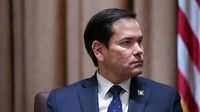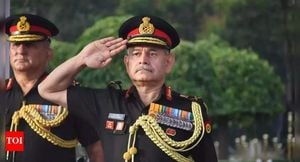In a dramatic escalation of hostilities between India and Pakistan, U.S. Secretary of State Marco Rubio has been actively engaging both nations in a bid to de-escalate the situation. This comes after a series of military confrontations that have left many fearing an all-out war. On May 10, 2025, Rubio spoke with both Pakistani Army Chief Asim Munir and Indian External Affairs Minister Dr. S. Jaishankar, emphasizing the need for diplomatic solutions over military actions.
Hours before the ceasefire announcement between New Delhi and Islamabad, the U.S. had publicly condemned Pakistan for its support of terrorism, while simultaneously urging India to pursue diplomatic avenues. The complexity of U.S. diplomacy in this context cannot be overstated, as it seeks to balance its relationships with both nations amid rising tensions.
On Saturday, May 10, Rubio reiterated his calls for de-escalation during a conversation with Munir, who recently oversaw Pakistan’s launch of airstrikes against India in an operation dubbed 'Operation Bunyan Ul Marsoos.' This military action marked a significant escalation, with Pakistani forces targeting 26 locations across India in retaliation for previous Indian airstrikes.
According to a statement from the U.S. Department of State, Rubio urged both parties to find ways to de-escalate and offered U.S. assistance in starting constructive talks. "Secretary of State Marco Rubio spoke with Pakistani Army Chief Asim Munir earlier today. He continued to urge both parties to find ways to de-escalate and offered U.S. assistance in starting constructive talks in order to avoid future conflicts," State Department spokesperson Tammy Bruce stated.
Rubio's proactive approach also included a call to Indian External Affairs Minister Dr. Jaishankar on May 8, where he expressed U.S. support for direct dialogue between India and Pakistan. He emphasized the importance of improving communications to prevent further conflicts. Following the conversation, Jaishankar confirmed that India’s response to provocations has been "targeted and measured," and he thanked the U.S. for its commitment to working with India in the fight against terrorism.
The backdrop of this diplomatic flurry is the recent Pahalgam attack on April 22, which resulted in the deaths of 26 individuals, including tourists, and has intensified hostilities between the two nations. The violence has drawn international attention, with the G7 condemning the attacks and calling for restraint.
Rubio's involvement comes at a crucial time, as he holds multiple significant positions in the Trump administration, including U.S. foreign secretary and acting National Security Advisor. His recent discussions with both Indian and Pakistani leaders reflect a concerted effort by the U.S. to mediate the escalating tensions.
In a statement from the White House, press secretary Karoline Leavitt conveyed President Trump’s desire to see a swift de-escalation in the conflict. "The President has expressed he wants to see this de-escalate as quickly as possible. He understands these are two countries that have been at odds with one another for decades," Leavitt said.
On the ground, the military actions have been severe. Early on May 10, India launched strikes against three Pakistani airbases—Nur Khan in Rawalpindi, Murid in Chakwal, and Rafiqui in Jhang. This retaliation came shortly after reports of Pakistani drones being sighted in multiple locations across India, prompting alarm and military readiness.
In response to the escalations, the Indian military successfully intercepted several ballistic missiles fired by Pakistan, one of which was aimed at New Delhi. Despite the tensions, both nations have been careful in their military strategies, with India emphasizing a measured response to provocations.
General Asim Munir, who has been at the helm of the Pakistani military since 2022, is viewed as a pivotal figure in these developments. His leadership comes amid accusations of consolidating power within the military and navigating the complexities of civilian governance. As tensions rise, Munir has been granted full authority to plan military responses, which are reportedly being shaped by the ongoing conflict with India.
Analysts have noted that Munir's hardline stance on India aligns with a broader military doctrine that has historically viewed India as a primary adversary. His comments in previous months have underscored a mentality that sees the two nations as fundamentally incompatible, stating, "our religions are different, our cultures are different, our traditions are different, our thoughts are different, our ambitions are different." This ideological divide complicates the potential for peaceful negotiations.
As the situation continues to unfold, the stakes remain high. Both countries are armed with significant military capabilities, and the risk of miscalculation looms large. With the U.S. stepping in to mediate, the hope is that diplomatic channels can be re-established to prevent further escalation.
In the face of these challenges, the international community watches closely, hoping for a resolution that can bring stability to a region long plagued by conflict. The coming days will be crucial in determining whether diplomacy can prevail over military confrontation in South Asia.





